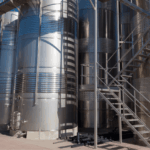Chemical Recycling in Waste Management
Increasing waste is one of the world’s most challenging problems today. As a nation, Americans generate more waste than any other nation in the world with 4.5 pounds (2.0 kg) of municipal solid waste (MSW) per person per day, 55% of which is contributed as residential garbage. Without more effective and sustainable ways to manage produced waste, more and more waste will end up in landfills, polluting our land, water, and air.
Contaminated and mixed waste products (e.g., plastic, paper, industrial waste, medical waste, MSW) are challenging to recycle by mechanical/physical processing. Traditional plastic waste recycling has difficulties and limitations. Mechanical sorting is not effective for mixed plastic waste. Combinations of different resin types, dyes, and additives manufacture thousands of different types of plastic. In addition, the plastic material quality is very susceptible to contamination. Even carefully selected plastic materials can only be recycled limited times in similar products since it degrades every time after reheating. Therefore, most plastic products are downcycled into items of reduced value, such as textiles, toys, or fibers, and eventually end up in landfills and water resources creating tremendous environmental problems. Replacing plastics with alternative materials, such as glass and metals would cost more to manufacture due to the higher energy and other resource consumption. The problem is the way the current waste management operates.
Waste plastic can be recycled into high-value products using advanced and cost-effective waste conversion technologies. Recycling is not simply reusing waste products. It aims to redesign and convert waste into forms retaining as high value as possible in a circular economy. We need sustainable and effective waste management to protect our environment and develop a working circular economy. In such an economy, chemical recycling can be pivotal in converting waste into usable materials and clean energy.
Chemical recycling based on cost-effective waste conversion technologies can provide a fundamental shift in producing waste handling. Using cost-effective waste conversion technologies is an innovative waste management strategy to divert waste from landfills, produce clean energy and sustainable products, reduce the depletion of natural resources, protect our environment, and save time and money. Chemical recycling is a comprehensive and innovative solution to the complex waste management problem and moves us closer to a truly circular economy.
For more than 25 years, LEC Partners has fostered innovation at the forefront of the bioeconomy. We have a highly differentiated market position centered around our deep subject matter expertise in very specialized areas. We help clients minimize technical and economic risk by leveraging best practices in our industries, and we have a long track record of providing insightful analysis and practical advice.
Our visibility and reputation are unparalleled because we provide a simplified process with a single point of contact to a diverse international network of proven experts in biofuels, biomaterials, the circular economy, and emerging technologies. Providing access to over 150 world-renowned bioeconomy experts helps us create tailored solutions to meet each project’s individual needs. Please take a look at our experts and the services we provide. Call us at 1+ (501) 833-8511 or email us for further information.
Have some questions?
Not sure where to start?
Let's start a conversation. We're here to help you navigate
the bioeconomy with confidence.

